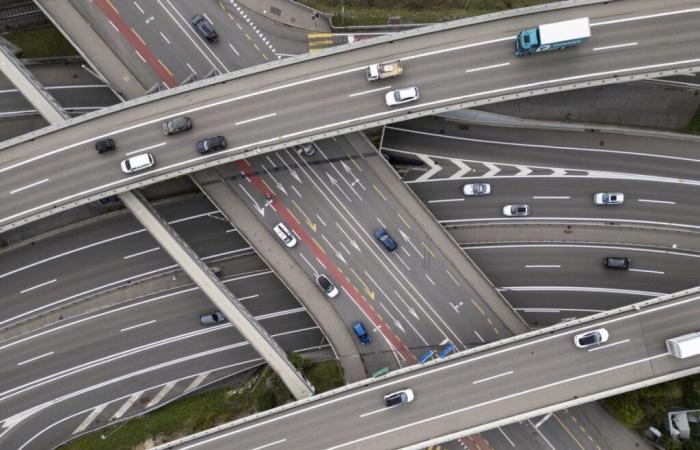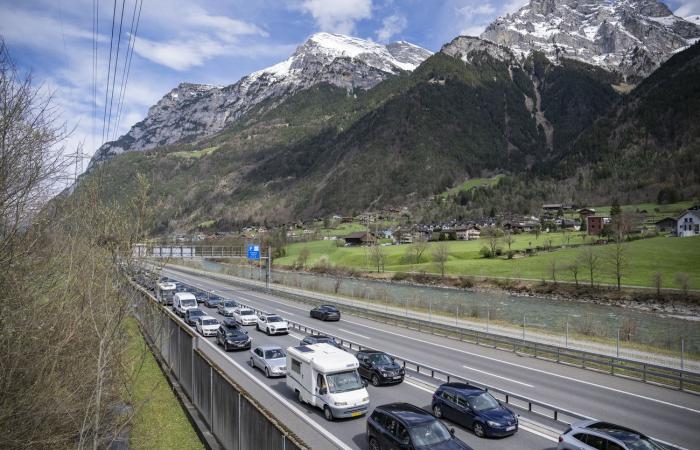The Federal Council and Parliament would like to widen six sections of motorway to combat traffic jams, but the people could refuse the project.
Keystone / Anthony Anex
Less than two weeks before the federal votes on November 24, a majority of Swiss would refuse the extension of the motorway network, reveals the second SSR poll. This no trend is also perceptible among the Swiss electorate living abroad.
This content was published on
November 13, 2024 – 06:00
Supporters of highway widening continue to lose ground.
While a slight majority of citizens still supported the project a month ago, the situation has reversed, according to the second SSR survey carried out by the gfs.bern institute. A slim majority of Swiss people (51%) are now against the extension of the motorway network, while only 47% of the electorate still supports it and 2% remains undecided.
The support of the Swiss abroad for this object has also collapsed. During the first survey, the diaspora surprisingly appeared much more favorable to the authorities’ plan to relieve congestion on the road network than the Swiss people as a whole. Now it is divided: half support it and half oppose it.
This trend corresponds more to the voting behavior, usually more ecological, of the Swiss abroad. “They may have had more time to learn about the object,” says gfs.bern political scientist Martina Mousson to explain the decline in support of the Fifth Switzerland for this object.
The formation of opinion is more advanced on the extension of motorways than on the other objects put to vote. The political scientists of gfs.bern note a strong polarization: the electorate of the Socialist Party (PS), the Greens and the Liberal Green Party (PVL / center) oppose the project, while people close to the parties of right are in favor of it. Those who do not trust the government also oppose it.
“It is also interesting to note that the difference in voting intentions between men and women increased during the campaign,” observes Martina Mousson. A large majority of women intend to vote no in the ballot box, while the majority of men intend to vote yes.
The political scientists at gfs.bern note a clear shift in opinion towards no, but still believe that the outcome of the vote is difficult to predict. “It will depend a lot on the mobilization of supporters of the project in the home stretch,” considers Martina Mousson.
The survey
For the second poll ahead of the federal votes on November 24, 2024, the gfs.bern institute questioned 10,358 voters between October 28 and November 7. The statistical margin of error is between +/-2.8 percentage points.
Yes to uniform funding of care still in the majority
The yes to uniform financing of health benefits (EFAS) has also lost weight (-7 percentage points), but it remains in the majority, shows the second SSR survey. 54% of voters still support the Parliament and government project and 37% oppose it. A significant portion of those surveyed (9%) are still undecided, probably due to the complexity of the project.
The gap between the left and the right has widened: supporters of the PS are more clearly in the no camp than in the first opinion survey, while people close to the right-wing parties are in favor of the reform.
“The yes camp has a slight advantage,” notes Lukas Golder of gfs.bern. The latter, however, remains cautious about the result of the vote, stressing that the unions’ arguments against the project seem to penetrate strongly into certain groups of the population. “If the opponents want to win, they will have to convince the undecided,” he summarizes.
Uncertainty around the tightening of subletting
Support for the two changes to tenancy law submitted to the people on November 24 also collapsed over the course of the campaign.
However, a relative majority of the electorate (50%) is still in favor of a tightening of subletting conditions, while 47% say they are opposed to it and 3% do not yet have an opinion, shows the SSR survey.
The no camp gained nine percentage points and the yes camp lost 14. This reflects a clear tendency towards no, underline the political scientists at gfs.bern. The trend is similar among the electorate of the Fifth Switzerland, even if the latter approves of the text more widely.
Opponents perceive this reform as undermining the protection of tenants and consider that the current restrictions on subletting are sufficient. Those who approve of it, however, score points with the problems posed by subletting via online platforms.
Despite the progression of the no vote, gfs.bern considers that the outcome of the vote remains uncertain and will depend on the final mobilization.
Towards a no to facilitating the termination of the lease
The picture is clearer regarding the other change to tenancy law, which would make it easier for a landlord to terminate a tenant’s lease if they want to use the accommodation for themselves.
53% of those surveyed plan to refuse this revision, while 44% are for and 3% are undecided. As with the first text, opposition to the modification has clearly strengthened, among the Swiss abroad as well as those residing in the country.
Here too, the project is interpreted as an attack on tenant protection, according to gfs.bern. This is going badly in a country where tenants represent some 60% of the population. The polling institute’s political scientists therefore expect a refusal at the polls on November 24.
Trust in authorities at its lowest
The number of no votes increased throughout the campaign for the four items submitted to the people’s vote on November 24. A trend which does not correspond to the normal pattern of opinion formation for projects emanating from the authorities.
This is indicative of the electorate’s loss of confidence in the government and Parliament, in the eyes of Lukas Golder. “Confidence has never been this low since 2018,” says the political scientist.
Distrust of authorities can be explained by different factors, according to the specialists at gfs.bern. “The numerous defeats in federal votes this year probably don’t help,” notes Lukas Golder.
Martina Mousson also notes that the federal advisors have only been discreetly involved in defending the objects submitted to the people. She cites the example of the Minister of the Economy, Guy Parmelin, who only paid lip service to the reform of tenancy law, while repeating that the Federal Council initially saw no reason to change. . “The impression that many problems are not resolved fuels distrust, particularly the war in Ukraine,” Martina Mousson also argues.
>> Our Let’s Talk filmed debate on the people’s confidence in Parliament:
Proofread and verified by Samuel Jaberg
Learn more
Following
Previous
Plus
Why Switzerland, a country of rail, is still a country of motorways
This content was published on
23 oct. 2024
Some Swiss highways are close to saturation. Nearly 50,000 hours were lost in traffic jams last year. But the roots of the problem lie elsewhere than in infrastructure, according to specialists.
read more Why Switzerland, a country of rail, is still also a country of motorways

Plus
Does Switzerland need wider highways?
This content was published on
07 nov. 2024
The Swiss vote on the widening of part of the motorway network. swissinfo.ch journalist Katy Romy explains to us what is at stake in the election.
read more Does Switzerland need wider motorways?








